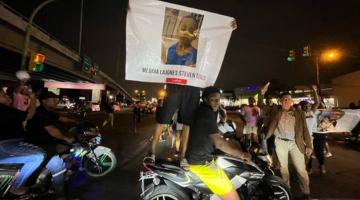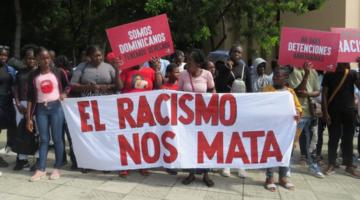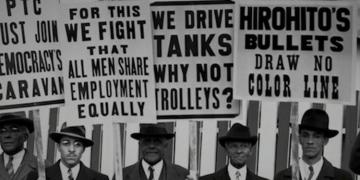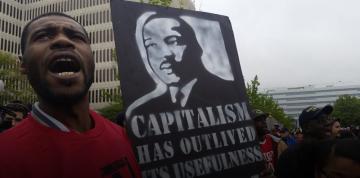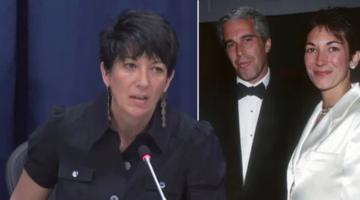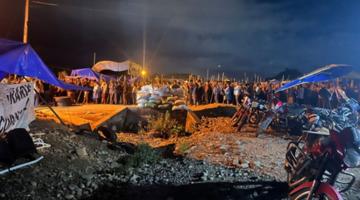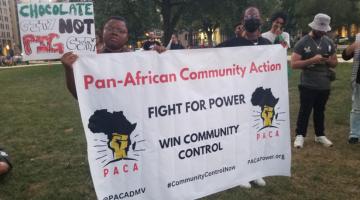Like prisons, healthcare systems are part of the way that empire reproduces itself.
“Anti-blackness has not distorted medical relationships and institutions, so much as built them.”
The past six months have highlighted the fight that Black people are in against state violence, both in the form of policing and the US healthcare system. Though the ruling class cries that the coronavirus pandemic is “the great equalizer,” the virus continues to demonstrate exactly who our capitalist health-care system was designed to keep alive. So far, across the country, about 42% of coronavirus deaths have been Black people, even though they were only about 21% of the population in the areas analyzed. InLouisiana, over 70% of people who died were Black (despite Black people being only 32% of the population). Along with high rates of death, countless stories have emerged about Black people turned away from hospitals, struggling to access testing, and being disproportionately arrested or ticketed for not following public health guidelines. On top of this, uprisings have taken hold across the country, starting in Minneapolis after the murder of George Floyd. Many groups are calling for police to be de-funded and for the abolition of the prison industrial complex. In the midst of a pandemic, it is crucial to understand how the prison industrial complex intersects with the medical industrial complex, and commit to abolishing both.
“The virus continues to demonstrate exactly who our capitalist health-care system was designed to keep alive.”
Though medical institutions portray themselves as benevolent and objective, the structural reality is that biomedicine was forged in the political and social terrain of colonialism. Commonly known as the medical industrial complex, we are all affected by a huge system that provides “healthcare” services for profit and makes billions of dollars each year. Mia Mingus, a writer and community organizer who focuses on disability justice, helped put together the above detailed visual of the medical industrial complex along with other organizers like Cara Page and Patty Berne. The diagram shows how four “core motivations” serve as the foundational structuring agents of the four sections of the visual. Desirability structures health, population control structures safety, charity and ableism structure access, and eugenics structure science and medicine. This is what makes the medical industrial complex so profitable.
Along with its foundations in anti-blackness, the medical industrial complex is also inherently gendered and contoured by ableism, fatphobia, and anti-transness. Internationally, all of these systems of domination affect vaccine development and allocation of medicines. This diagram also beautifully illustrates how all of these parts are interconnected and serve to sustain each other. In the bottom right-hand corner, we can see that the prison industrial complex has its own place in the diagram. The abolition of the prison industrial complex requires the knowledge that our systems of medical “care” have been built on carceral logics, from the criminalization of domestic violence survivors to psychiatric hospitals. In “Are Prisons Obsolete?” Angela Davis writes that board members from the Corrections Corporation of America and the Hospital Corporation of America, one of the first private hospital companies, worked together to help found Correctional Corporations of America in 1983. Like prisons, healthcare systems are part of the way that empire reproduces itself.
“Our systems of medical “care” have been built on carceral logics.”
Black health disparities are not an incidental feature of the healthcare system. The coronavirus pandemic has further demonstrated that the medical industrial complex is so deeply deleterious to Black people that reforms like increasing the number of Black doctors or unconscious bias training for healthcare professionals are not enough to ensure Black people’s live. The values of the medical industrial complex run in contradiction to the well-being of all Black people. In her essay The Death Toll, Saidiya Hartman writes, “the health-care system is routinely indifferent to black suffering, doubting the shared sentence of bodies in pain, uncertain if the human is an expansive category or an exclusive one, if indeed a human is perceived at all.” The pledge to “do no harm” has little meaning when Black people are still excluded from the human. Ultimately, Black “health” is an impossibility in a system built and sustained by anti-black violence and logics.
From its inception, the medical industrial complex has been in service of white supremacy and capitalism. In Frantz Fanon’s essay “Medicine and Colonialism,” he writes, “The colonial situation does not only vitiate the relations between doctor and patient. We have shown that the doctor always appears as a link in the colonialist network, as a spokesman for the occupying power.” The ruling class continues to claim that biomedicine is simply abused occasionally for evil purposes, which purposefully detracts from addressing that it has always been a child of slavery and European colonialism.
“Black ‘health’ is an impossibility in a system built and sustained by anti-black violence and logics.”
It is no coincidence that today, many health studies continue to act as though race is a biological category that exists without racism. Race-making has always been a crucial mission of the medical industrial complex. In his 1851 “Report on the Diseases and Physical Peculiarities of the Negro,” Samuel Cartwright, a prominent physician, writes about a mental illness called drapetomania which compels slaves to run away. Twenty-four years after Cartwright’s report, Oliver Wendell Holmes Sr., dean of Harvard Medical School and an avid eugenicist, wrote an 1875 essay about mechanisms of crime. He writes, “If genius and talent are inherited...why should not deep-rooted moral defects and obliquities show themselves, as well as other qualities, in the descendants of moral monsters?” Theories of genetic inferiority created by physicians were the same that Prudential, one of the largest insurers of Black people at the time, used to justify their announcement in 1881 that insurance policies held by Black adults would be worth only one third those of white people’s. Their weekly premiums, however, would be the same. It should come as no surprise then, that a 2020 paper published in the Journal of Internal Medicine was entitled, “Obesity in African-Americans: is physiology to blame?” before public outcry forced a change in title.
Experimentation on Black people has also created the foundation for medical knowledge. People often reference the Tuskegee Syphilis Study, but there are also a plethora of other studies that were conducted on Black people, like the “Acres of Skin” experiments done by dermatologist Albert M. Kligman on incarcerated Black men in Philadelphia from 1951 to 1974.
“Race-making has always been a crucial mission of the medical industrial complex.”
White doctors even abused Black people after their deaths. In her book Medical Apartheid, scholar Harriet Washington explores the histories of medical schools stealing the bodies of Black people for dissection practice into the 20th century, even going do far as to rob Black cemeteries. Of course, medical history is also rife with examples of doctors abusing Black people’s reproductive freedoms. From J Marion Sims’ experimental surgeries on enslaved Black women in 1845, to George Gey’s 1951 theft of Henrietta Lacks cells which still power the medical industrial complex, biomedical encounters have always been a threat to Black women’s health. The Eugenics Board of North Carolina didn’t cease operations until 1977, and of the almost 8,000 people sterilized in the state, about 5,000 were black.
While medical and research institutions make sure to target Black people for experimentation and abuse, they also systematically deny Black people healthcare resources. Chicago’s Southside neighborhood lacked an adult trauma center until 2018, despite its high rates of gun violence. This is just a part of a long history of medical facilities being intentionally built far away from predominantly Black neighborhoods.
Framing any of the cases above as an exceptional misuse of science is a dangerous way of avoiding the conversation that they are all expected outcomes of a system that was never made to ensure the health of Black people. Science and medicine have not simply absorbed the racism of other institutions, they are institutional violence themselves. The state continues to discredit Black peoples’ legacies of healing through granny midwives, root workers, and conjurers because they are a threat to white supremacist capitalist medicine. Black people have been, and continue to be, the enemies of medicine. In the end, white people are only able to secure their own health when they can place it next to the unwavering illness of black people that they create and re-create.
“Biomedical encounters have always been a threat to Black women’s health.”
Abolition, whether of the prison industrial complex, military industrial complex, or the medical industrial complex, is always a positive project. Once the old systems are destroyed, we are faced with the task of world-building, of learning to “imagine a constellation of alternative strategies and institutions,” as Angela Davis says. For the medical industrial complex, this means having conversations where the point of departure is the truth that Black people know what keeps them well. This means asking friends and family what it is they need to heal. For many, this means uplifting the holistic healing practices of our ancestors with the understanding that care can transcend both space and time.
Throughout history, Black liberation has always involved finding ways to ensure the well-being of one another outside of the state and its medical institutions. From enslaved women exchanging recipes for abortifacients with each other to granny midwives like Margaret Charles Smith, who delivered over 3500 infants in rural Alabama during the 20th century and never lost a mother in childbirth. From the Black Cross nurses who provided Black people with health services and education, to all the Black farmers who belonged to Fannie Lou Hamer’s Freedom Farm Collective.
“Midwife Margaret Charles Smith delivered over 3500 infants in rural Alabama and never lost a mother in childbirth.”
One of the most relevant examples of community healthcare and preventative services is the Black Panther Party and their survival programs. In spring of 1970, Black Panther Party made free health clinics and programs to feed children breakfast mandatory for each chapter. Health clinics were staffed by volunteer doctors and nurses, as well as activists, who encouraged patients to ask questions and advocate for themselves. Physicians were trained in alternative forms of medicine as well as biomedicine, and the BPP required that doctors read the work of Mao, Che, and other revolutionaries. Along with their clinics, the BPP did research and screening on genetic disorders like sickle cell anaemia, provided immunizations, and trained members of the community as lay health workers who were able to provide both health services and social services. The legacy of these programs lives in many organizations, collectives, and health centers today.
In our current moment, groups all over the country are creating networks where people can access healthcare without relying on the medical industrial complex or prison industrial complex. Dream Defenders, a radical group of young people in Florida, has established a Trauma Response Center to combat the violence of both systems. The center offers “free legal services, violence interruption, mental health counseling, stop the bleed training as well as skills training and job placement, arts programming,” among other services. In Chicago, a volunteer Black health collective and mutual aid organization called Ujimaa Medics runs workshops on gunshot first aid, and also teaches people to respond to asthma attacks, seizures and diabetic emergencies. There are also organizations like Project LETS, which builds “peer support collectives” and other community-based mental healthcare systems. When we abolish the medical industrial complex, this is the world that awaits us.
“The BPP did research and screening on genetic disorders like sickle cell anaemia, provided immunizations, and trained members of the community as lay health workers.”
Mia Mingus writes, “What would it mean to not have to be afraid of going to the doctor? To be able to trust that the care and treatments you are receiving will not only take care of your body, but the planet and future generations as well?” Abolition looks like creating networks and institutions that answer these questions. The demise of the medical industrial complex gives us the opportunity to fully imagine and reimagine these new systems as our needs change, because they belong to us. The goal of this space is not to become human as defined by colonialism, but to generate Black healing from the violence wrought by ideas of health. Once we come to the collective understanding that anti-blackness has not distorted medical relationships and institutions, so much as built them, we are able to continue to imagine ways of taking care of ourselves and our communities that actually improve the wellbeing of all Black people. The abolition of the prison industrial complex and medical industrial complex are inextricably linked. We can keep us safe, and we can also keep us healthy.
Gwendolyn Wallace (she/her) is a senior at Yale University pursuing a BA in the History of Science and Medicine, concentrating in Gender, Reproduction, and the Body. Her research interests include histories of community health activism, reproductive justice, and the intersections between race-making, science, and medicine. Gwendolyn enjoys working with young children, gardening, and searching for used bookstores to explore.
COMMENTS?
Please join the conversation on Black Agenda Report's Facebook page at http://facebook.com/blackagendareport
Or, you can comment by emailing us at comments@blackagendareport.com

